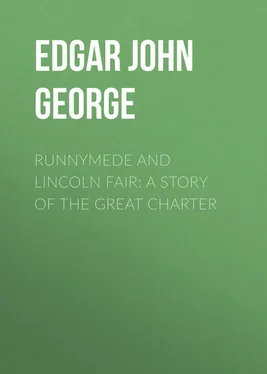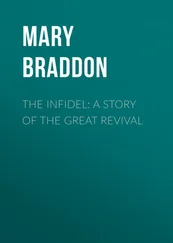John Edgar - Runnymede and Lincoln Fair - A Story of the Great Charter
Здесь есть возможность читать онлайн «John Edgar - Runnymede and Lincoln Fair - A Story of the Great Charter» — ознакомительный отрывок электронной книги совершенно бесплатно, а после прочтения отрывка купить полную версию. В некоторых случаях можно слушать аудио, скачать через торрент в формате fb2 и присутствует краткое содержание. Жанр: foreign_antique, foreign_prose, на английском языке. Описание произведения, (предисловие) а так же отзывы посетителей доступны на портале библиотеки ЛибКат.
- Название:Runnymede and Lincoln Fair: A Story of the Great Charter
- Автор:
- Жанр:
- Год:неизвестен
- ISBN:нет данных
- Рейтинг книги:3 / 5. Голосов: 1
-
Избранное:Добавить в избранное
- Отзывы:
-
Ваша оценка:
- 60
- 1
- 2
- 3
- 4
- 5
Runnymede and Lincoln Fair: A Story of the Great Charter: краткое содержание, описание и аннотация
Предлагаем к чтению аннотацию, описание, краткое содержание или предисловие (зависит от того, что написал сам автор книги «Runnymede and Lincoln Fair: A Story of the Great Charter»). Если вы не нашли необходимую информацию о книге — напишите в комментариях, мы постараемся отыскать её.
Runnymede and Lincoln Fair: A Story of the Great Charter — читать онлайн ознакомительный отрывок
Ниже представлен текст книги, разбитый по страницам. Система сохранения места последней прочитанной страницы, позволяет с удобством читать онлайн бесплатно книгу «Runnymede and Lincoln Fair: A Story of the Great Charter», без необходимости каждый раз заново искать на чём Вы остановились. Поставьте закладку, и сможете в любой момент перейти на страницу, на которой закончили чтение.
Интервал:
Закладка:
King John had not been inattentive to the effect which his remark as to the buck had produced, nor even to the low murmur of disapprobation it drew forth. On the contrary, he had been awake to all that passed, and could not but repent of having rashly uttered words which were so likely to be repeated to his disadvantage; and, as he reflected, his memory recalled a long array of similar imprudences, for almost every one of which he had been under the necessity of atoning. Haunted by such recollections, he rode forward as if to avoid conversation with his courtiers and comrades; and his desire to be alone was so manifest that they gradually fell behind, and allowed him to precede them at such a distance that he might indulge undisturbed in his reflections, whatever the colour of these might be.
And thus silently the hunting party made its way up the glades of the forest, the king riding in front on his white palfrey, with a hawk on his wrist and his mantle waving in the spring breeze. Suddenly, as the palfrey paced along, one of the forest bulls, with his eyes glaring fire, and mane and tail erect, excited by John’s scarlet mantle, rushed from among the trees, and almost ere he was aware of his danger, charged the king so furiously that the palfrey and he were instantly overthrown and rolled on the ground. Loud cries of astonishment and horror broke from the hunting party, but nobody was near enough to render the slightest assistance. Pausing for a moment and bellowing furiously, the bull made a rush to complete its work, and it seemed that John’s fate was to die on the spot. At that instant, however, from the other side of the glade sprang a man of mighty proportions, dressed as a forester, and attended by a huge dog barking fiercely, and without hesitation, apparently without fear, seized the bull by the horns. Terrible then was the struggle, and such as not one man in ten thousand could have maintained for a moment. But not even an inch of ground did the forester yield to his ferocious antagonist. Pressing back the bull’s head with an arm of iron, he grasped an iron club that was suspended from his belt, and dealt with all his might a blow on the animal’s vital part which brought it heavily to the ground, while a loud shout of relief and of admiration burst from the spectators. Next moment the forester’s dagger was plunged into the bull’s neck; the fierce animal was writhing convulsively in the agonies of death; and the king, unwounded but trembling with wonder, leant calmly with his back to a tree, as if he had merely been a spectator of the exploit that had been performed.
“Now, by my Halidame!” exclaimed Lord Neville, eyeing him with admiration, “the man who could do such a deed must have the courage of ten heroes in his heart, and the strength of ten gladiators in his arm.”
“My lord, you say truly,” replied Oliver Icingla, excitedly. “I know something of him, and if there is in broad England a man whose single hand could stay the rush of a hundred foes, it is Forest Will, or Will with the Club.”
It was at this moment that John, having risen to his feet, and assured himself that he was not seriously hurt, looked his preserver keenly in the face.
“By God’s teeth!” exclaimed the king, taken somewhat aback, “I surely dream. Is it William de Collingham that I see before me?”
“In truth, king,” answered the forester with a dauntless air, and something like a sneer on his handsome features, “I once bore the name which you have mentioned; but when you were pleased, in the plenitude of your power, to outlaw me and send me into exile, I dropped the Collingham, not caring to burden myself with the duties which bearing it involved, and I have since gone by whatever name my neighbours have thought fit to bestow on me.”
“William,” said the king, “I owe you a life, for you have saved mine this day.”
“Well, sire,” replied the outlaw, “I dare be sworn that it is more than those would have cared to do this day by whose counsel I was brought to ruin, and forced to herd with broken men.”
“By God’s teeth! you speak no more than the truth,” exclaimed John, before whose mind’s eye the outlaw’s word conjured up several of the barons, once in his favour, but now leagued for his destruction. “But let bygones be bygones. I now know you better, and will more value your services in time to come.”
The outlaw bent his strong knee to the king, and John’s eyes gleamed with satisfaction; for he knew that he had secured one ally who, in the approaching struggle, would serve him with a fidelity proof against trials and temptations.
But the good-humour which this consideration created in John’s breast was destined to be short-lived. Scarcely had he returned to the Tower of London when news of evil import reached him. It was to the effect that Alexander, King of Scots, had yielded to the persuasion of Hugh de Moreville, and formed an alliance, offensive and defensive, with the barons of England. John was vexed in the extreme; but the intelligence was so depressing that he was not violent, only vindictive.
“Alexander of Scotland, and the people whom he rules, shall have reason to rue his rashness. As for Hugh de Moreville, I will without delay show the world how I punish such treachery as his. Let his kinsman, Icingla, be forthwith seized and secured, lest he attempt to escape; for, by the light of Our Lady’s brow, he shall hang ere sunset!”
“Sire!” exclaimed Lord Neville in horror, “you would not hang Oliver Icingla? I will answer for his loyalty.”
“Answer for yourself, my Lord Neville,” said John, frowning sternly, for he was in that temper in which a man cannot distinguish friends from enemies, if they are unfortunate enough to cross his humour.
CHAPTER X
WILLIAM DE COLLINGHAM
THE name of William de Collingham was of high account in his day and generation. Moreover, his name occupies a conspicuous place in the history of the great contest which desolated England in the second decade of the thirteenth century.
It is difficult to decide whether the Collinghams were of Saxon or Danish origin. Most probably they were originally Danes, who landed with King Sweyn when he came, in 1004, to avenge the cruel massacre of his countrymen, and who, under the rule of Canute the Great, settled quietly in Yorkshire. However, Collingham himself was neither a Saxon nor a Dane, but an Englishman; and the armorial figure on his shield and white banner was a raven of fierce aspect in full flight, which, about the year 1216, became very terrible indeed to the enemies of England.
William de Collingham was chief of a family that had risen to baronial rank in England during the stirring reigns of Henry and Richard; and the two earliest of our Plantagenets had profited by their loyal services. Moreover, ten years before our story opens, William had been in favour with King John; and, being then a young and handsome chevalier of twenty-five who had proved his valour and prowess in the tilt-yard and in the wars carried on against Philip Augustus, he was held in much esteem in England. But William had since experienced, to his cost, the caprice of fortune. About 1205 he had the misfortune to be so far led astray by his imagination as to aspire to the affections of Eleanor, “the fair damsel of Brittany,” sister of the ill-fated Arthur, and, in consequence, involved himself in serious trouble. Men jealous of his renown, and eager to seize his possessions, represented the affair in such a light that John, – to whom the existence of a daughter of his elder brother caused much anxiety, seeing that, according to the laws of succession, she had a legal claim to the crown which he wore – was frightened out of his propriety; and Collingham atoned for his too-romantic aspiration by banishment from the realm. One of his bitterest enemies was the queen.
Читать дальшеИнтервал:
Закладка:
Похожие книги на «Runnymede and Lincoln Fair: A Story of the Great Charter»
Представляем Вашему вниманию похожие книги на «Runnymede and Lincoln Fair: A Story of the Great Charter» списком для выбора. Мы отобрали схожую по названию и смыслу литературу в надежде предоставить читателям больше вариантов отыскать новые, интересные, ещё непрочитанные произведения.
Обсуждение, отзывы о книге «Runnymede and Lincoln Fair: A Story of the Great Charter» и просто собственные мнения читателей. Оставьте ваши комментарии, напишите, что Вы думаете о произведении, его смысле или главных героях. Укажите что конкретно понравилось, а что нет, и почему Вы так считаете.












